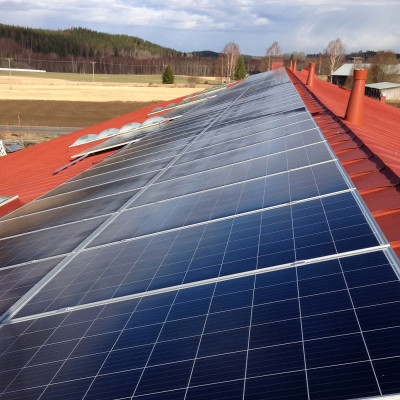No products available yet
Stay tuned! More products will be shown here as they are added.
ACTIONS ARE MORE IMPORTANT THAN BIG WORDS

Renewable electricity
Since 2010, we have used only carbon-neutral electricity in all our operations. In May 2018, 228 solar panels were installed on the roof of our factory. In the first year of operation (May 4, 2018-May 3, 2019), the yield of the panels was 54 MWh, or slightly more than a quarter of our electricity consumption. With this amount, the electric car would have traveled the distance from the earth to the moon and 270,000 km even in the winter test of the World of Technology.
Fabrics
The basic materials we use are most often 100% polyester or 100% natural materials, e.g. cotton and linen. Polyesters are also available made from (RC) recycled polyester. Fabrics and knitwear are only purchased from operators who meet environmental standards, mainly from Europe. Fabrics and knitwear made in Finland are used as much as possible. You should also read VTT's research on the carbon footprint of printed textiles Environmental performance of future digital textile printing.
Reuse and disposal
We strongly recommend recycling the products:
• Flagging products can be made into small products after advertising use, e.g. bags, aprons, tablecloths.
• End-of-use fabrics can be used as protective fabrics for civil engineering.
• Products that have been used for a short time can be donated to schools and kindergartens as craft supplies.
• End-of-use products can also be returned still for us to recycle.
Small particles and impurities attached to products that have been in the open air for a long time prevent their meaningful and safe reuse. The products we manufacture can be disposed of by incineration without harmful emissions, which come from e.g. in the disposal of commonly used PVC products (e.g. vinyls). Our production does not use PVC-based raw materials, materials or their derivatives.
At its best, as a reusable and easy-to-store material, the fabric is perfectly suited as advertising material for repeated campaigns and events.
Printing inks and waste management
Our production does not use plastisol inks containing PVC and plasticizers, but only water-based printing inks. The easiest way to identify water-based printing inks in products is that they withstand ironing. The printing inks are removed as precisely as possible from the printing charts before they are washed, so that the load in the waste water is as low as possible. In November 2018, we renewed the exposure of the diagrams, which made films and their chemicals a thing of the past. Our process water will be cleaned from December 12, 2019 at the Tommola treatment plant in Pälkäne, which has a good biological cleaning process. We deliver the surplus colors to the Ekokem waste treatment plant in Riihimäki for disposal.
Solid waste is sorted so that the proportion of actual landfill waste remains as low as possible.
Transportation
In both the purchase and sale of products, we try to avoid air transport whenever possible. We require our workers, material suppliers and stakeholders to follow our principle:
"We imagine fabrics – leaving no traces"

No products available yet
Stay tuned! More products will be shown here as they are added.
check_circle
check_circle